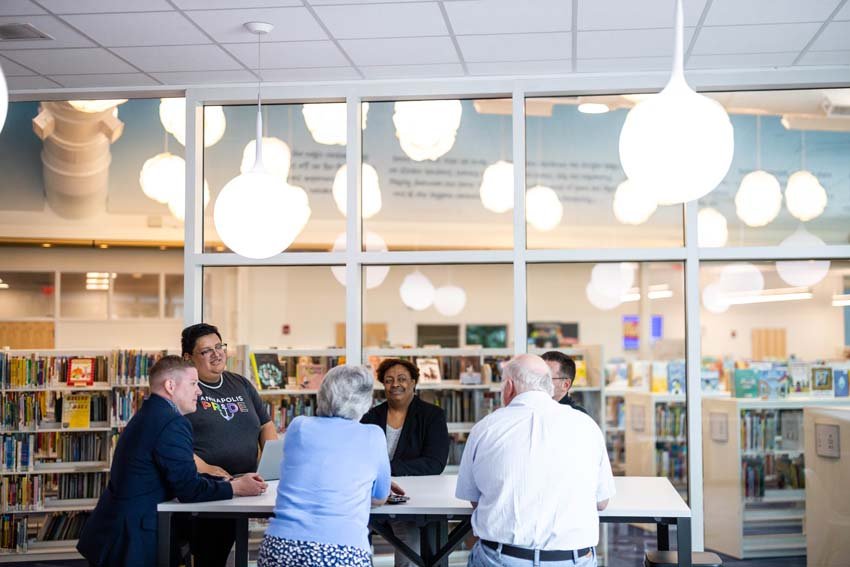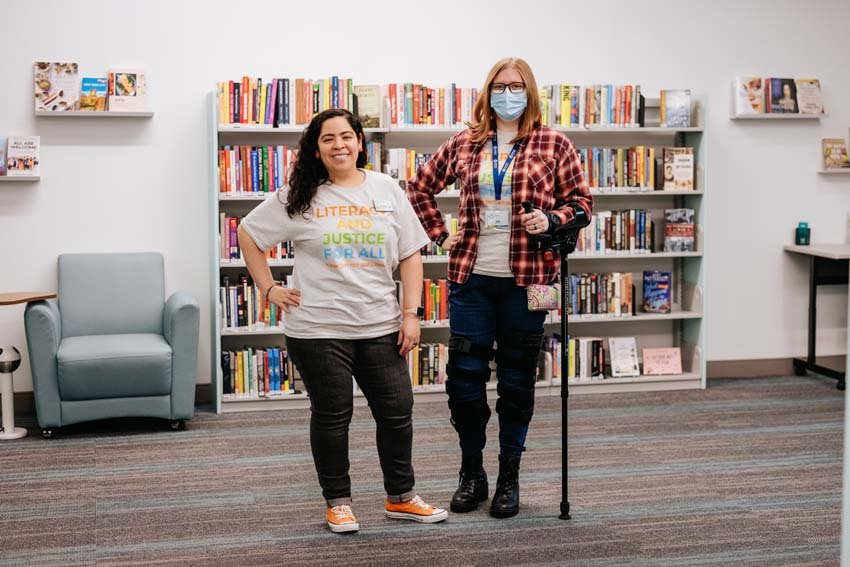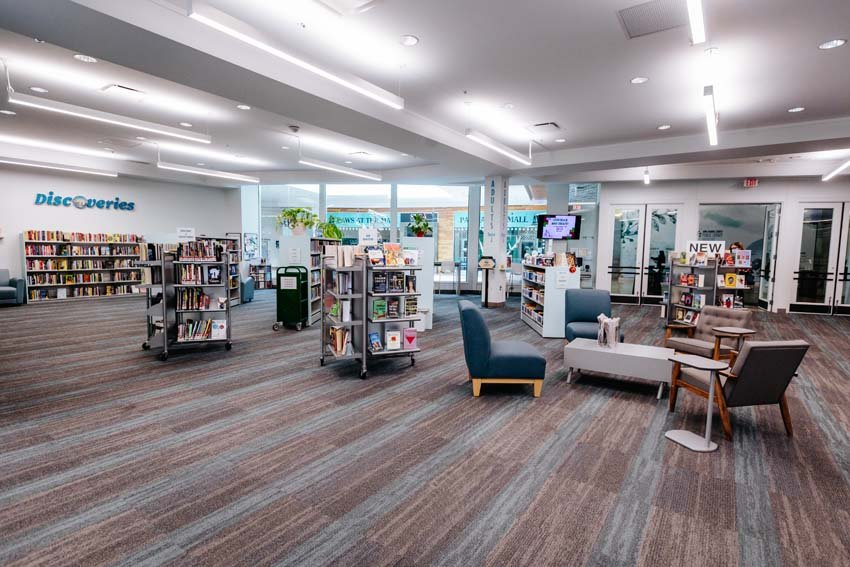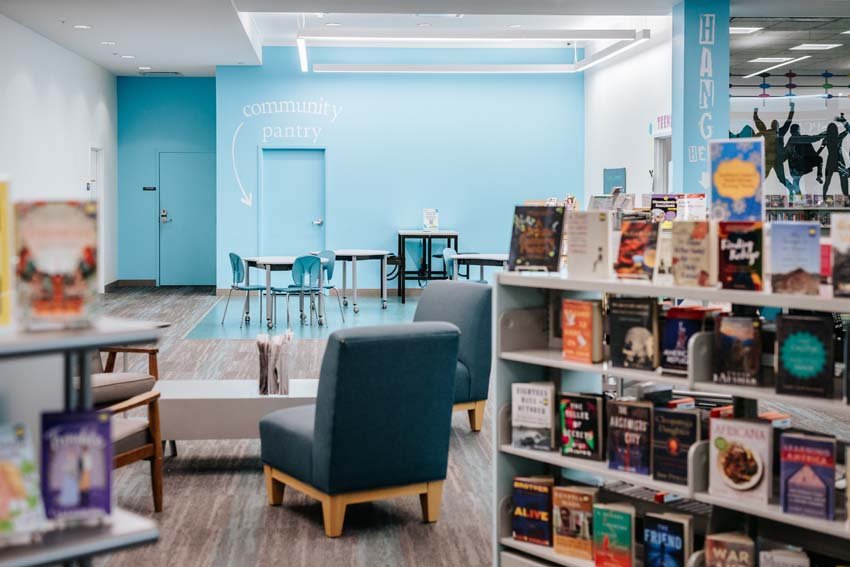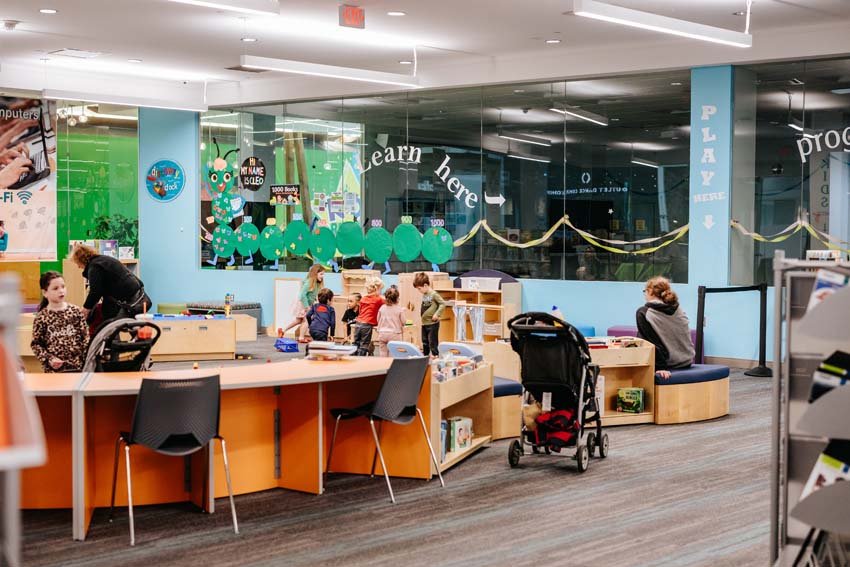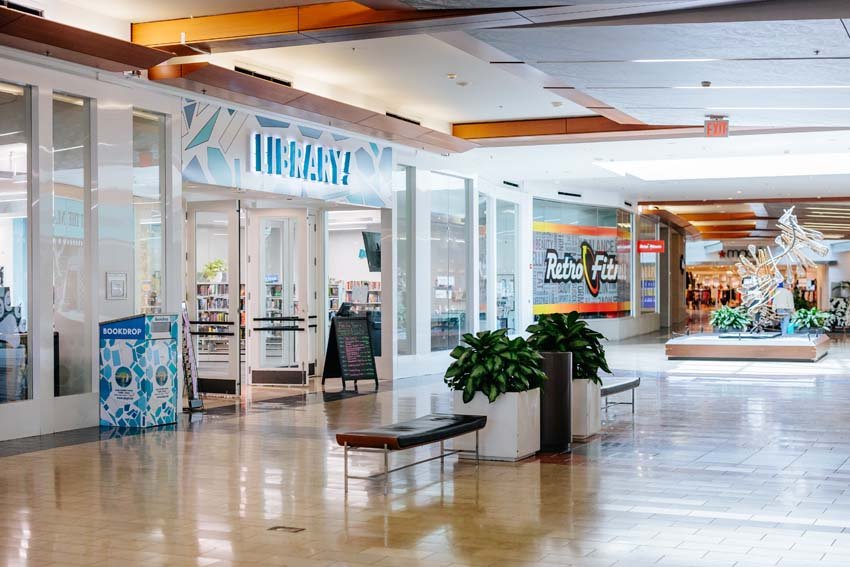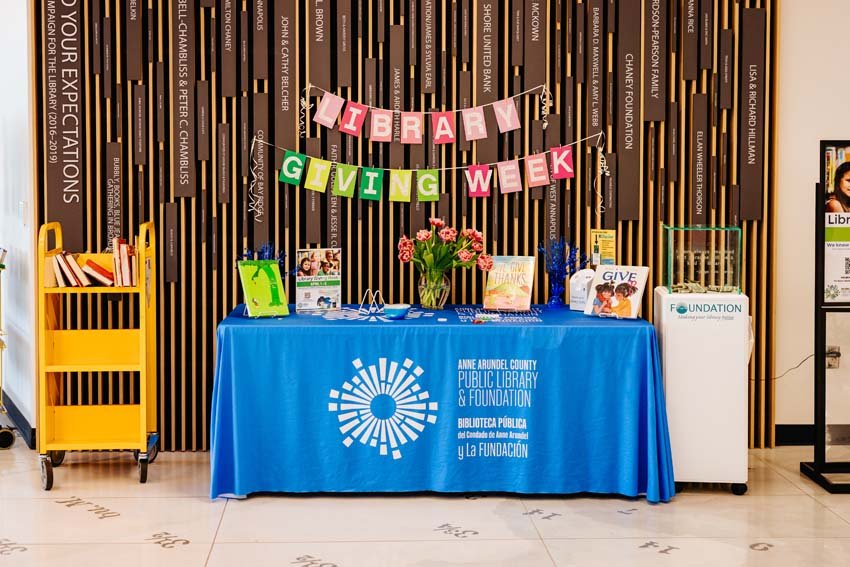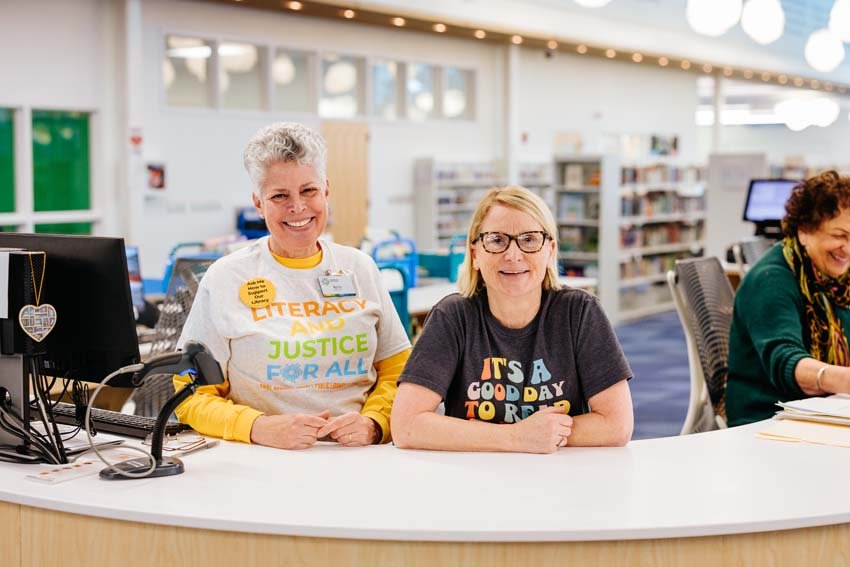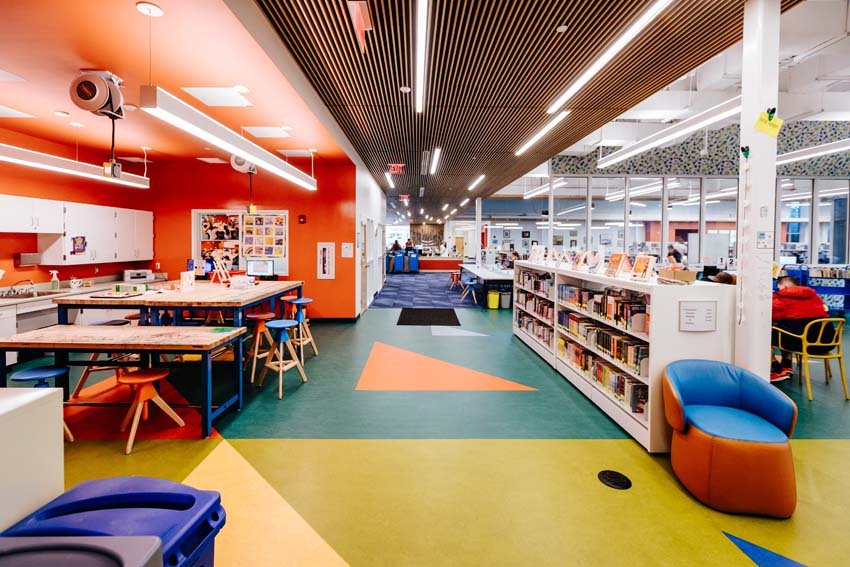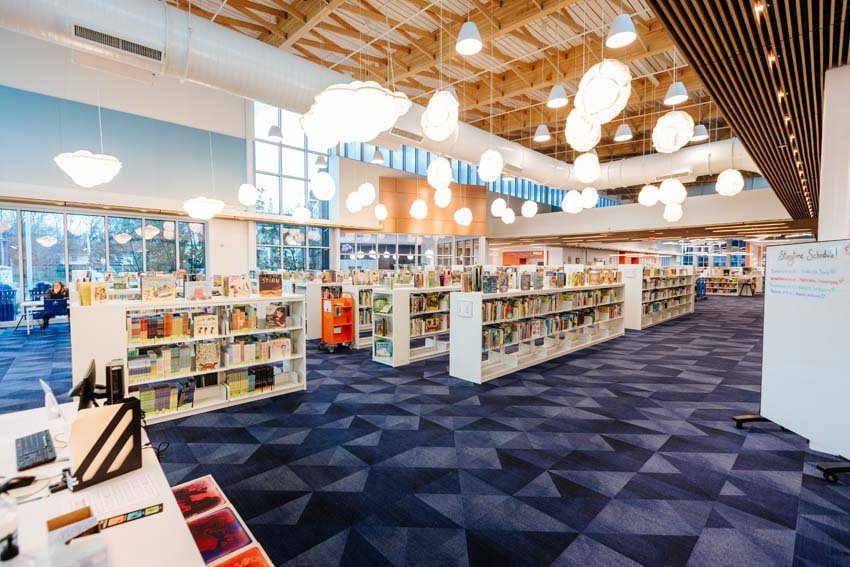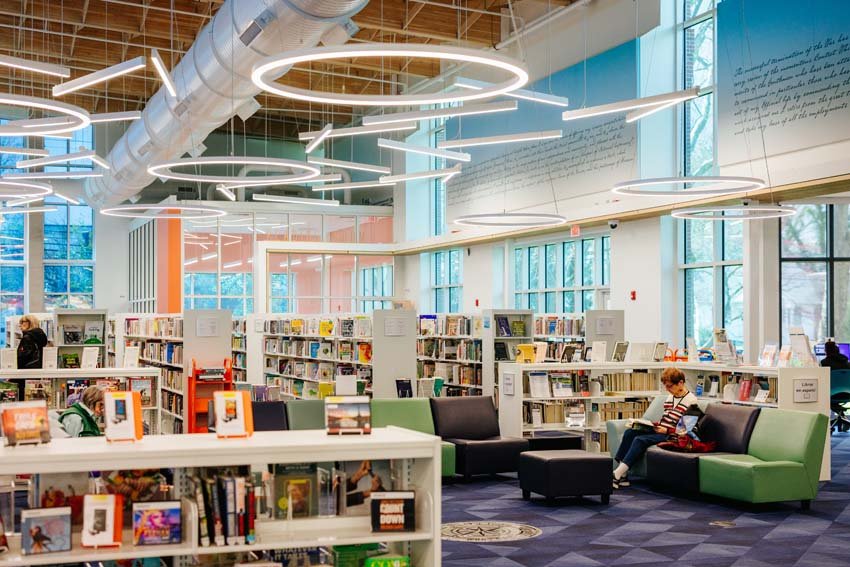+ By Desiree Smith-Daughety + Photos courtesy of Mary Ella Jourdak
Aisle after aisle of the Michael E. Busch Annapolis Library is adorned with a mosaic of book bindings that promise everything from adventure to edification. Books live here. But there is much more here as well. The library has evolved into the nexus for a community, with roots that push deep—beyond its canopy of reading material—and stretch wide to embrace patrons young or mature. While books provide windows into the world, Anne Arundel County Public Library (AACPL) offers a door to the heart of a neighborhood.
The AACPL provides a broad array of community programs and events, including movie nights, author talks, teen writing clubs, ask-a-lawyer sessions, yoga, art exhibits, artist talks, and more. That’s in addition to the numerous resources available to anyone. The library’s quarterly Happenings newsletter is available online and allows readers to peruse the plethora of upcoming programs.
The cost of admission: free.
Skip Auld helms the AACPL. This involves an executive leadership team, division managers, library managers, and library staff for 16 branches. The Board of Library Trustees is the organization’s governing body, pulling volunteer representatives from all over the county. Auld, who has been CEO since 2010, recounts the last recession’s lasting effects—salaries were cut to prevent layoffs, pay was flat, and the renovation budget was slashed. After the economy rebounded, an influx of funds enabled new programs, such as supporting a focus on early literacy and creating interactive centers, Discovery Docks, that promote creative and educational play. The first was set up in the Michael E. Busch Annapolis Library on West Street before they were added to all 16 locations.
“My main approach to leadership is servant leadership; to be the best listener I can be, to try to enable staff and their creativity and innovative spirit, and to see where we can go to unlock the energy, ideas, and warm feelings of all the staff,” says Auld. “They’re the ones who do everything and make it happen.” He credits Becky Hass, programming and outreach manager, for being transformative for the library system. “It’s her approach to life and relationships, and her understanding of the world of libraries and what they mean to the community,” he says.
“Programs, including the arts, are a natural way to connect and celebrate,” says Hass. “The library gets to be a vehicle and a conduit.” With the library’s focus on kindergartner readiness, support is offered for the crucial period between birth and age five. “We support families with education who maybe weren’t connected with the community before,” she says. “We’ve been very intentional about offering more bilingual programming and working with partners and organizations, which has been the key to success.”
Christine Feldmann, director of marketing and communications, says, “Programs are running at every library on a weekly basis, including the traditional story time, but it’s also time to teach the parent or caregiver to be a child’s first teacher—and we provide skills for them to do so.”
Anyone can submit a program proposal. Program matchmaking is then conducted to see if the library can make it happen. The Invite the Library form may be filled out to request that the library participate at a school or community event. For example, if an artists’ group wants to know about business development or grants, then the group could host an event during which the library helps by providing expertise on those aspects of the artist’s journey.
“Staff also come up with ideas to spark creativity to see how to connect with customers through programs in uniquely different ways, such as hosting online book clubs, murder mystery book clubs, and online cooking,” says Feldmann. “A lot of programs had their birth [during the COVID-19 pandemic]; it did spark the next chapter in the library’s future, including programs being done today.”
The library has become rooted in every facet of the community beyond providing books and other media. “The US Surgeon General released a report describing an epidemic of loneliness and isolation and lists libraries as social infrastructure through our programs and physical spaces within communities,” says Hass. Social programs include food donations, COVID-19 test kits, and, through an initiative with the Anne Arundel County Health Department, vending machines with fentanyl test kits that are currently available at some library branches.
Funding was also sought to provide social workers. The Anne Arundel County Department of Social Services saw the benefit and now provides regular library-based outreach. “Deale has the most business. It’s more rural, and people can come to the library for resources,” says Auld. “Everyone knows the libraries, which are a great place for community partnerships.”
These partnerships are community cornerstones for support in multiple areas. “One of the gifts of the pandemic is the amazing growth of entrepreneurship,” says Hass. “Along with Anne Arundel Community College’s workforce development program, how do we support these entrepreneurs better, and keep supporting innovative spirit in the county? We’re also aware of growth opportunities around equity in our county and figuring out how to be a culturally responsive library. We’re aiming to be more community-led in our development.”
Library programs are developed to address community needs, including equity and inclusion. The leadership team envisions having staff reflecting the people they serve. One program’s aim is to expand the applicant pool, introducing diverse people to the field as a career. “Diversifying the workforce is needed,” says Auld. “I would love to get 10 years down the road and it’s accomplished.”
While the library works to make everyone feel welcome and included, those efforts haven’t been without controversy. Book banning efforts, for example, have been on the rise in the United States. According to the American Library Association, there were efforts to remove or restrict access to over 140 titles in Maryland in 2023. Anne Arundel County is part of that dataset. “In June, we celebrate Pride Month,” says Auld, “and there are books highlighted to check out, to educate, enrich, and inspire. A patron returned to a branch in August, having checked all of these books out in June and [was] glad no one ‘had to be exposed to those books.’ When the books go missing, more are purchased, anyway.”
Some of the dissent has overtones of violence. “Library staff get threatened, with bomb threats having increased 600% since 2019 in Maryland alone,” says Feldmann.
Libraries strive to provide a balanced collection of materials to meet the needs of everyone. If someone doesn’t want or like a book, then they don’t have to check it out.
“If there’s any plus side to it, the world is learning a lot more about what we do, why we do it, how valuable it is, and that we’re pretty reasonable, ethical, and responsible people,” says Auld. “We’re here, 100 percent, for the people we’re serving.”
